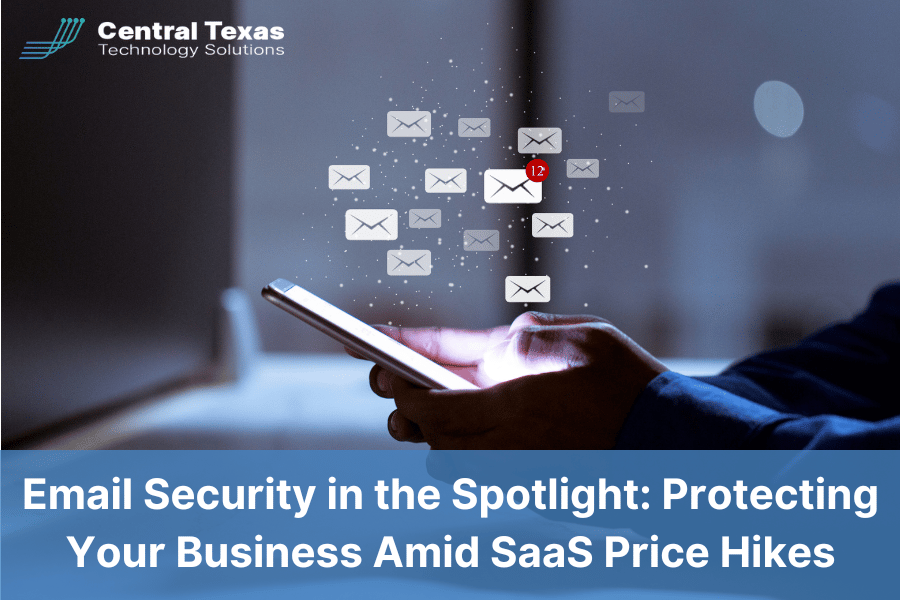
No one ever said running a business would be cheap. But with inflation rising in recent years, business owners are facing unprecedented surges in costs across the board. As consumer inflation rates increase, tech prices have nearly quadrupled, leaving companies reevaluating their budgets. One area that demands your attention? Email security.
Below, we’ll explore the importance of email security in today’s digital landscape, the rising costs of SaaS tools, and how businesses can cut costs without compromising their cybersecurity.
What Are SaaS Applications?
Software as a Service (SaaS) refers to cloud-based tools offered by third-party providers, accessible via applications or web browsers. Instead of paying a large upfront fee, users pay a monthly subscription or pay-as-you-go charges. SaaS providers manage the underlying infrastructure, including updates, data storage, and security.
Popular SaaS applications include:
- Productivity tools like Slack, Asana, and Dropbox
- E-commerce platforms such as Shopify
- Data warehousing services
- Specialized tools like email security applications
Businesses typically maintain a SaaS portfolio, which may include hundreds of tools. In fact, the average corporation uses 370 SaaS applications to streamline operations, support communication, and secure sensitive data.
The Rising Costs of SaaS Tools
SaaS prices have skyrocketed. Starting in 2022, many providers began implementing aggressive price hikes. By the end of 2024, 73% of SaaS vendors are expected to have raised their rates by over 12%. Some, like Webflow, saw price increases of 23% in a single year.
This has led businesses to scrutinize their SaaS portfolios. Studies reveal that only 44% of SaaS tools are actively used, leaving the remainder as unnecessary fluff. Companies are trimming the fat by cutting redundant tools, but this raises an important question: What tools should you keep?
Why You Can’t Afford to Drop Email Security
While some tools may be expendable, email security is not. Hackers are becoming more sophisticated, targeting businesses through phishing scams, malware, and Business Email Compromise (BEC) attacks. Without proper defenses, your business risks:
- Data breaches: Loss of sensitive customer and company information
- Financial losses: From ransomware payments or fraudulent transactions
- Reputational damage: Lost customer trust and potential legal action
To safeguard your business, cloud-based email security solutions are essential.
Features of a Robust Email Security Solution
If your business is considering a streamlined tech stack, ensure your email security solution includes the following:
- Email Encryption: Secures sensitive data as it travels through email.
- Threat Detection: Monitors and alerts you to unauthorized or suspicious activity.
- Phishing and Malware Defense: Protects against increasingly advanced attacks, including BEC schemes.
- Multi-layered Security: Offers multiple lines of defense to ensure no vulnerability is overlooked.
These tools are not just for large corporations. Small and medium-sized businesses also face rising cyber threats and need reliable email security to protect their assets.
Balancing SaaS Costs Without Sacrificing Security
While trimming your SaaS portfolio is often necessary, focus on optimizing costs without jeopardizing critical services like email security. Here’s how:
- Audit Your SaaS Portfolio: Identify which tools are unused or redundant.
- Consolidate Tools: Look for integrated solutions that provide multiple services.
- Leverage Built-in Features: Many email platforms, like Microsoft 365, include robust security tools.
- Partner with Experts: Managed IT providers can help you navigate rising costs while maintaining top-notch security.
By being strategic, you can manage SaaS costs without putting your business at risk.
The Bottom Line
As SaaS costs continue to rise, businesses are under pressure to streamline their operations and cut unnecessary expenses. But not all applications are created equal. While you might reduce the number of collaboration tools or file storage apps, email security should remain a top priority.
By investing in robust email security, you’ll protect your business from data breaches, financial loss, and reputational harm. In today’s digital landscape, securing your email systems is not just a smart decision—it’s a business imperative.
FAQ: Common Questions About Email Security
1. What makes email security so critical for businesses?
Email is a primary target for cyberattacks like phishing, ransomware, and Business Email Compromise (BEC). Without robust email security, businesses risk losing sensitive data, damaging their reputation, and incurring financial losses.
2. How can small businesses afford email security amid rising SaaS costs?
Small businesses can optimize costs by consolidating tools, leveraging built-in security features in platforms like Microsoft 365, and working with Managed IT providers to implement cost-effective solutions.
3. What features should I look for in an email security solution?
Essential features include email encryption, advanced threat detection, phishing protection, and a multi-layered security approach to guard against sophisticated cyber threats.
By prioritizing email security, your business will be equipped to thrive despite the rising costs of SaaS tools. Protect your communication channels and stay one step ahead of cybercriminals.
Contact CTTS today for IT support and managed services in Austin, TX. Let us handle your IT so you can focus on growing your business. Visit CTTSonline.com or call us at (512) 388-5559 to get started!
